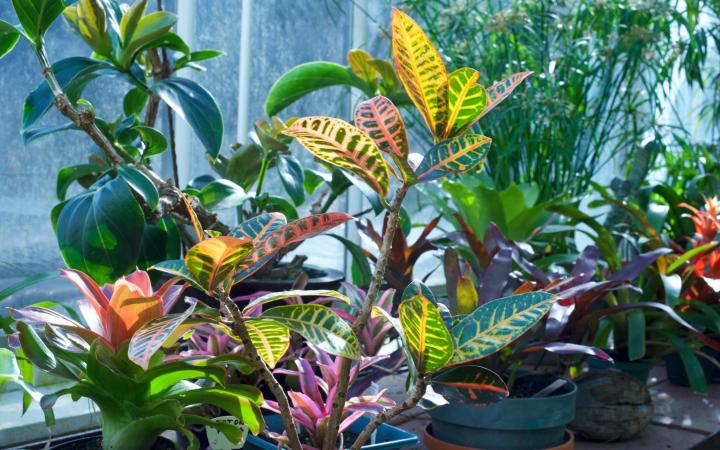
Also receive the Almanac Daily newsletter including gardening tips, weather, astronomical events, and more.
Growing Croton Plants: Watering, Lighting, Repotting, and Pests
ADVERTISEMENT
We moved our croton to our bedroom that gets more light and humidity, but are now experiencing a garlic smell. We haven't cooked or eaten garlic and seems to be getting stronger. The smell isn't on or around the plant, it just floats around the room, not strong just there. Is it the croton? Next step is to remove it from our bedroom, but it is doing well there.
While it is great news that your croton is doing well, the corresponding less-great news is that the odor you are detecting is almost certainly the croton. I’ve not heard it described as garlicky before, but crotons often have a scent that has been described as “old oranges.” I am not aware of any tricks to lessen the smell, so if it continues to be bothersome, it might be time for the croton to find a new home. Our friends at the University of Florida extension service have plenty of good advice when it comes to growing crotons: https://sfyl.ifas.ufl.edu/media/sfylifasufledu/manatee/docs/pdfs/master-gardners/newsletters/February-2017.pdf
Can Croton be planted during fall season in Central Florida?
Because crotons are tropical plants, they do not handle frost or cold weather well. For that reason, planting in fall is a riskier proposition than planting earlier in the season. This is not to say that, under the right circumstances, that it won’t work. But I’d certainly have an eye on both the long- and short-term forecasts before committing. Our friends at the University of Florida extension service also have some other tips for growing crotons in central Florida.
Will dear eat Crotons?
Hi Jan,
Croton is mostly deer-resistant, but with that being said, like most plants there is a chance if a hungry enough deer comes by your property it might take a few nibbles.
While mostly grown as a houseplant, if croton is something you intend to planting outdoors, it is only hardy in Zones 11–12. It also does well in locations with warm, humid summers, but will need to be brought indoors when nighttime temperatures drop to around 50°F.
Here is a list we have compiled of deer-resistant plants https://www.almanac.com/deer-resistant-plants.
Hope this helps!
I have 2 Crotons in front of my house about 3' tall, lush, and dense. Plenty of sun and water. This summer they have developed a white powder-like substance on the leaves (both sides) and branches. What is it and how to control it? The plants don't appear to be suffering.
If your croton are growing outdoors, I assume you live in a pretty warm climate. The most likely culprit when it comes to white powder on the leaves is powdery mildew, and the good news is that it can easily be treated: https://www.almanac.com/pest/powdery-mildew
If your plants don’t respond to powdery mildew remedies, it may be time to call your local extension service for more thorough diagnosis.
https://www.almanac.com/cooperative-extension-services
My croton sits between a purple waffle and trailing watermelon begonia/vine. The croton is ok, but it's not killing it like the other two. New leaves at top are albino and drop off. I think I should let in more light vertically and maybe water this one a tad less and more often. Please advise if I have read the material correctly. Thank you.
Most of my leaves are falling off my plant. I water it once a week just like another one just like it. it is in a wicker basket. do I need to repot it and put a different type of soil in it? I have had it since September 24 from the flower shop today is November 13th.










